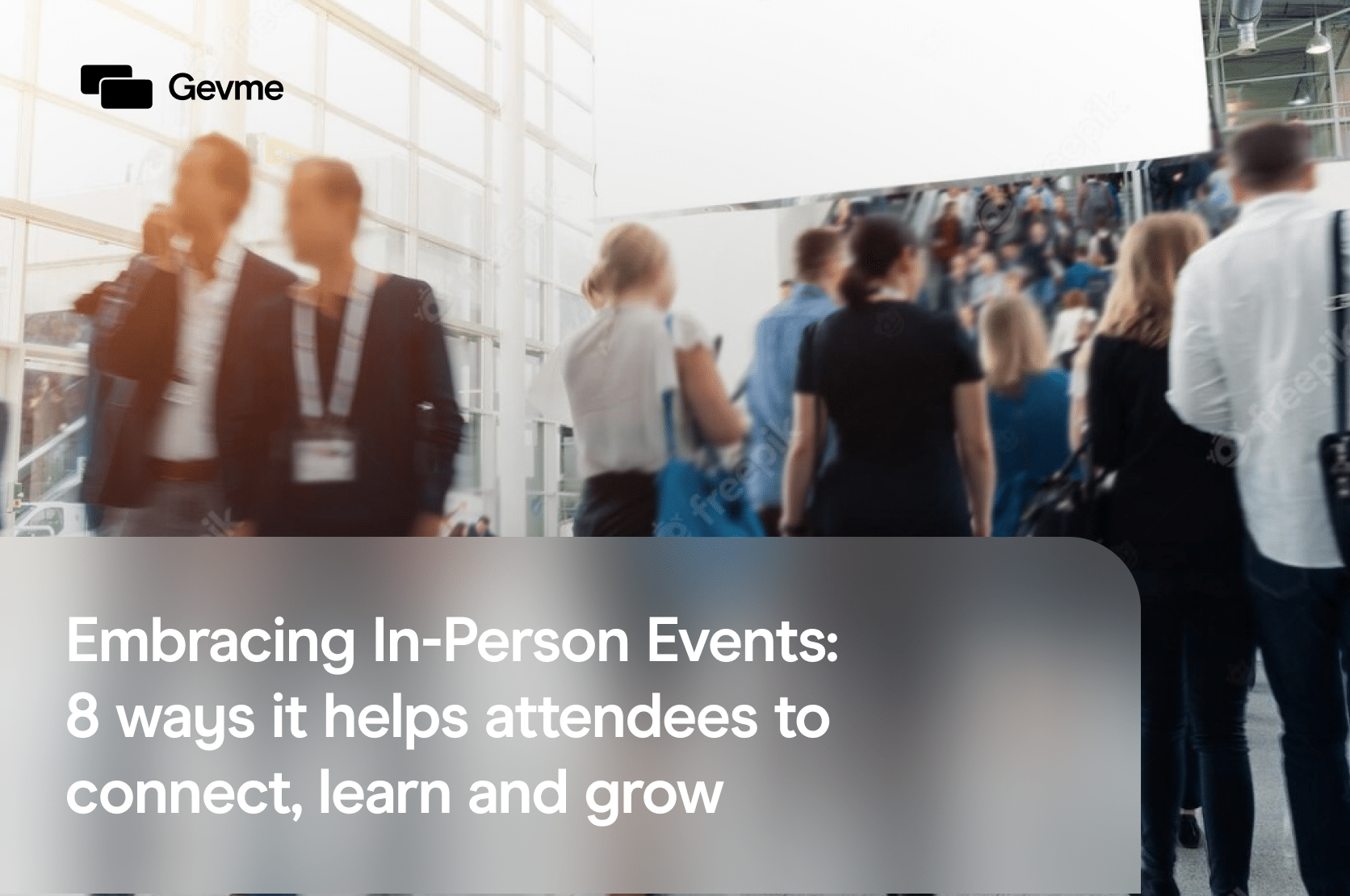The rise of technology and challenges presented by the Covid-19 pandemic resulted in a widespread acceptance towards virtual events but virtual events should not be mistaken as an alternative to in-person events.
In-person events foster authentic human connections, networking opportunities, and the chance for serendipitous encounters that are challenging to replicate virtually. The physical presence and real-time interactions create a vibrant atmosphere that generates lasting memories and emotional experiences for attendees. Additionally, the allure of exploring new venues, engaging with tangible exhibits, and enjoying face-to-face interactions contribute to the charm of in-person events.

Evolution of In-Person Events
The evolution of in-person events spans centuries, reflecting changes in societal norms, technological advancements, and the ever-growing demand for unique and immersive experiences. From ancient gatherings and medieval fairs to modern conferences and exhibitions, the evolution of in-person events has been shaped by various factors. Here’s an overview of the key stages in the evolution:
Medieval Gatherings and Industrial Revolution
In-person events have roots in ancient civilizations where gatherings and festivals played essential roles in religious, cultural, and social practices. These events served as opportunities for communal bonding, storytelling, and trade.
During the medieval period, fairs and markets emerged for commerce and trade. Merchants from different regions would converge to showcase and sell their goods. The Renaissance era saw the rise of intellectual gatherings, salons, and academic conferences. Scholars, artists, and thinkers came together to discuss ideas and foster intellectual exchange.
The Industrial Revolution paved the way for large-scale expositions and exhibitions, showcasing technological advancements and industrial achievements. The Great Exhibition of 1851 in London is a prominent example.
Conferences and Trade Shows
During the 20th century, there was a significant shift in how industries and organizations approached gatherings and events. With advancements in communication, transportation, and technology, the century witnessed the formalization and establishment of conferences, trade shows, and professional gatherings as essential components of business and networking strategies.
Conferences became structured platforms for professionals and experts to gather and exchange knowledge, research findings, and ideas. These events provided an opportunity for individuals in various fields to present their work, discuss emerging trends, and engage in intellectual debates.

Rise of Virtual Events
The advent of the internet and digital technologies revolutionized the way events were conducted, ushering in a new era of virtual events. The pandemic significantly accelerated the growth and adoption of virtual events. Webinars, online conferences, and virtual trade shows emerged as popular alternatives to traditional in-person gatherings, leveraging the power of connectivity and accessibility.
Virtual events enabled organisations to conduct interactive online workshops, seminars etc. Through virtual format, participants from different parts of the world were able to join live sessions or access recordings at their convenience.

Hybrid Events
In response to changing circumstances, hybrid events emerged, combining elements of in-person and virtual events. These events expanded the reach and accessibility of in-person gatherings while maintaining face-to-face interactions.
In recent years, the focus shifted towards creating experiential events that engage attendees on multiple sensory levels. Immersive environments, interactive installations, and live performances enhance the event experience.
Event Technology and Sustainability: Advancements in event technology have transformed event planning and execution. Mobile apps, event management software, augmented reality, and virtual reality have become integral to enhancing attendee engagement.
The event industry has also started adopting sustainable practices and promoting sustainability. Green initiatives, reduced waste, and eco-friendly event designs are becoming more prevalent.
Let’s delve into the multifaceted impact of in-person events, exploring how they enrich lives, transform businesses, and shape the future.
Impact of in-person events
Creating Authentic Connections
In-person events provide a unique opportunity to connect on a deeper, more personal level. The richness of non-verbal cues, eye contact, and physical presence fosters authentic connections, which are vital for building trust and relationships. Face-to-face interactions lay the foundation for lasting friendships, professional networks, and partnerships that extend beyond the confines of the event.
Engagement and Interaction
Driving engagement and interaction is a pivotal aspect of any event. When attendees actively participate and immerse themselves in the event experience, it enriches the overall atmosphere and creates a vibrant, dynamic gathering. Let’s have a look a the significance and strategies to drive engagement and interaction:
- Creating Engaging Content: Engaging content is the heart of any event. Presentations, workshops, panel discussions, and interactive activities should be carefully curated to captivate the audience’s attention and stimulate their interest. Engaging speakers who can convey their message effectively and inspire attendees play a crucial role in fostering active engagement.
- Interactive Sessions: In-person events offer the opportunity for real-time interactions, such as Q&A sessions, polls, and audience participation. These interactive elements encourage attendees to actively engage with speakers and each other, creating a sense of involvement and ownership in the event.
- Networking Opportunities: Networking is a core aspect of events. Organizers should design the event in a way that facilitates networking, such as dedicated networking breaks, social events, or matchmaking sessions. These opportunities encourage attendees to connect with like-minded individuals, exchange ideas, and establish valuable professional relationships.
Cultivating Emotional Intelligence
Emotional intelligence refers to the ability to recognize, understand, manage, and express emotions in oneself and others. In the context of events, cultivating emotional intelligence enhances the overall event experience, fosters authentic connections, and empowers individuals to navigate social interactions effectively.
- Emphasizing Self-Awareness: In-person events provide a conducive environment for attendees to develop self-awareness. Through various activities, workshops, and discussions, individuals can reflect on their values and behaviours.
- Effective Communication Skills: Cultivating emotional intelligence involves enhancing communication skills. In-person events offer opportunities for attendees to engage in face-to-face conversations, practice active listening, and express themselves authentically. Participants can learn to articulate their emotions, thoughts, and needs effectively, leading to more meaningful and empathetic interactions.
- Empathy and Understanding: In-person events create an empathetic space where attendees can learn to understand and respect others’ perspectives and emotions. Engaging in group discussions, sharing personal stories, and listening to diverse viewpoints foster empathy and open-mindedness, essential qualities for building harmonious relationships.
Knowledge Transfer and Learning
Knowledge transfer and learning are fundamental components of in-person events that contribute to attendees’ personal and professional development.
In a dynamic and rapidly changing world, events serve as platforms for sharing insights, expertise, and experiences, fostering continuous learning and growth.
- Curated Content and Expertise: Events curate content from a diverse range of experts, thought leaders, and industry practitioners. Attendees have the opportunity to learn from the best in their respective fields, gaining insights and knowledge that can’t be easily found elsewhere.
- Interactive Learning Experiences: In-person events offer interactive learning experiences that engage multiple senses and cognitive processes. Workshops, hands-on activities, and simulations create immersive environments that facilitate active learning and skill development.
- Access to New Research and Trends: In-person events often showcase cutting-edge research, emerging trends, and innovative practices. Attendees can stay updated with the latest industry developments, positioning themselves at the forefront of their fields.
- Peer Learning: In-person events encourage attendees to learn from their peers, exchange ideas, and share best practices. Conversations with like-minded individuals enrich the learning experience by providing diverse perspectives and practical insights.
- Opportunities for Professional Development: Many in-person events offer continuing education credits or certifications, providing attendees with opportunities for professional development and career advancement.
- Building a Community of Learners: In-person events create a sense of community among attendees who share common interests and goals. This community of learners supports ongoing learning even beyond the event, as attendees continue to connect and collaborate after the event concludes.
- Post-Event Resources and Materials: Post-event resources include presentation slides, recordings, and supplementary materials. These resources allow attendees to revisit and reinforce their learning long after the event concludes.
Boosting Innovation and Creativity
In-person events play a pivotal role in boosting innovation and creativity by creating an environment that fosters collaboration, inspiration, and diverse perspectives. Here’s how in-person events contribute to unleashing innovation and creativity:
- Collaborative Environment: In-person events bring together individuals from various industries, backgrounds, and expertise. The diverse pool of attendees allows for cross-disciplinary collaboration and brainstorming, leading to innovative ideas that might not have emerged in a homogenous setting. Exposure to different perspectives and thought-provoking insights broaden attendees’ horizons and challenge conventional thinking.
- Interactive Workshops: Many in-person events include interactive workshops and activities that engage attendees in hands-on experiences. These activities encourage experimentation, problem-solving, and creativity in a supportive and encouraging environment.
- Live Demonstrations and Showcases: Events often feature live product demonstrations, prototypes, or showcases of innovative solutions. Witnessing cutting-edge technologies and ideas firsthand sparks creativity and inspires attendees to think beyond traditional boundaries.
- Ideation Sessions: These structured activities encourage attendees to explore creative solutions and co-create ideas, fostering innovation.
.
Enhancing Brand Awareness and Loyalty
Enhancing brand awareness and loyalty is a crucial objective for businesses, and in-person events offer a powerful platform to achieve this goal. These events create unique opportunities to connect with the target audience on a personal level, build trust, and foster a lasting emotional connection with the brand.
- Direct Brand Engagement: In-person events enables attendees to experience the company’s products, services, and values firsthand. This tangible experience leaves a strong impression on participants and reinforces brand messaging.
- Creating Memorable Experiences: Events can be designed to provide memorable experiences that align with the brand’s identity and values. Memorable experiences leave a lasting impact on attendees, making them more likely to remember and positively associate with the brand.
- Face-to-Face Interactions with Brand Representatives: Meeting brand representatives and experts in person allows attendees to establish personal connections. Positive interactions build trust and credibility, contributing to enhanced brand loyalty.
- Showcasing Brand Innovations: Live demonstrations and hands-on experiences allow attendees to see the brand’s commitment to delivering value and staying at the forefront of the industry.
- Brand Storytelling: Brands can share their history, values, and mission, creating an emotional connection with the audience. Compelling narratives resonate with attendees, fostering brand loyalty.
Economic Impact
The economic impact of in-person events is significant and far-reaching, with implications for local economies, industries, businesses, and job markets. These events generate direct and indirect economic benefits that contribute to economic growth and development.
- Revenue Generation: In-person events contribute to revenue generation for various stakeholders, including event organisers, venues, exhibitors, and vendors. Ticket sales, sponsorship deals, exhibitor fees, and concession sales are primary sources of revenue for event organizers and venues.
- Boost to Local Businesses: Hosting in-person events brings a surge of visitors to the event host city or region. As attendees spend money on accommodation, transportation, dining, shopping, and entertainment, local businesses experience increased sales and revenue during the event period.
- Job Creation: In-person events create temporary and permanent job opportunities. Event planning and execution require a workforce that includes event staff, security personnel, catering staff, technical crews, and other service providers. The event’s economic impact extends to employment opportunities for local residents and businesses.
- Hospitality Industry Growth: The hospitality industry experiences a significant boost from in-person events. Hotels, restaurants, and transportation services benefit from increased demand during the event period. This growth sustains jobs and drives investment in the hospitality sector.
Cultural Exchange and Diversity
In-person events provide a unique platform for individuals from diverse backgrounds, cultures, and regions to come together, exchange ideas, and celebrate their differences.
Attendees have the opportunity to experience and appreciate different art forms, cuisines, and performances, fostering a sense of cultural pride and respect.
In-person events offer a space for cross-cultural learning and understanding. Attendees can engage in dialogues, workshops, and cultural showcases that broaden their perspectives and challenge stereotypes, leading to a more inclusive and accepting society.
The future of in-person events
In today’s dynamic event landscape, it is crucial for brands not to overlook in-person events, despite the growing popularity of cheaper virtual events. Incorporating both types of events strategically into their calendar is the key to staying competitive and relevant. At Gevme, we firmly believe that an omnichannel event strategy holds the future of business events calendars. This strategy involves brands organizing events across multiple channels throughout the year, ensuring maximum visibility and engagement.
While virtual events offer cost-effectiveness and convenience, in-person events provide invaluable face-to-face interactions, networking opportunities, and immersive experiences that foster strong connections with attendees. By carefully balancing both event types, brands can deliver a comprehensive and dynamic event calendar that caters to different audience preferences and objectives.
An omnichannel approach acknowledges the diverse needs of participants and recognizes that some events are better suited for physical gatherings, while others can thrive in virtual spaces. It also enables organisers to maintain relevance, expand their reach, and maximize the value of every event they organize. By leveraging the strengths of each channel, brands can create a well-rounded and impactful event strategy that complements one another, and ultimately strengthen their brand presence.
Whether it’s in-person, hybrid, or virtual events, Gevme’s comprehensive platform equips brands with the tools they need to successfully execute an omnichannel approach and pave the way for a successful future of business events with sustainability at its core that enables organisers to implement eco-friendly practices to reduce the environmental impact of events.








